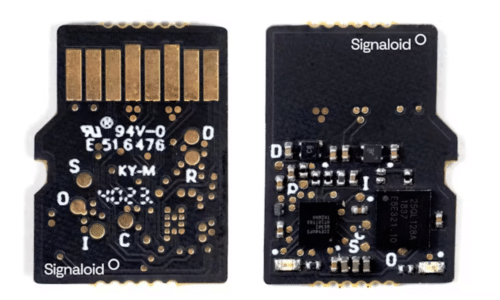The FPGA development board fits into a microSD slot for easy programming, suitable for wearables, IoT, and predictive modeling.

The Signaloid C0-microSD from Cambridge-based Signaloid is a compact iCE40 FPGA development board designed to fit and be programmed directly through a standard microSD card socket. The core technology is currently offered as an FPGA image for the Lattice iCE40UP5K FPGAs, which are used in the development board.
The tiny FPGA development board is designed for engineers, developers, and researchers involved in FPGA development, edge computing, uncertainty analysis, and embedded systems. Its compact size and unique programming model make it suitable for applications in wearables, IoT devices, and predictive modeling.
The development board features an FPGA, 128 Mbit of flash memory, 11 I/O signals, and two LEDs, all within the footprint of a microSD card. The LEDs are positioned near the top edge of the board, remaining visible when the board is inserted into a socket. Of the I/O pins, six are linked to the microSD interface, while the remaining five are accessible via surface mount pads on the board’s rear.
By inserting the C0-microSD into a host computer, it functions as a file-based device. Applications can communicate directly with the board or utilize the Operating System’s disk utilities. For instance, you can upload a new bitstream directly without needing an external programmer.
Users can also leverage the included Signaloid C0 RISC-V processor core with pre-built uncertainty algorithms for application integration. As the device operates as a microSD card, it is compatible with single-board computers or microcontrollers equipped with an SPI interface.
For further development, the company provides an accessory called the Signaloid SD-Dev carrier board. Measuring 57 x 57 millimeters, this board features a full-size micro-SD card socket, USB-C ports, micro HDMI, and additional connectors, facilitating expanded development and testing.
For more information, click here.








